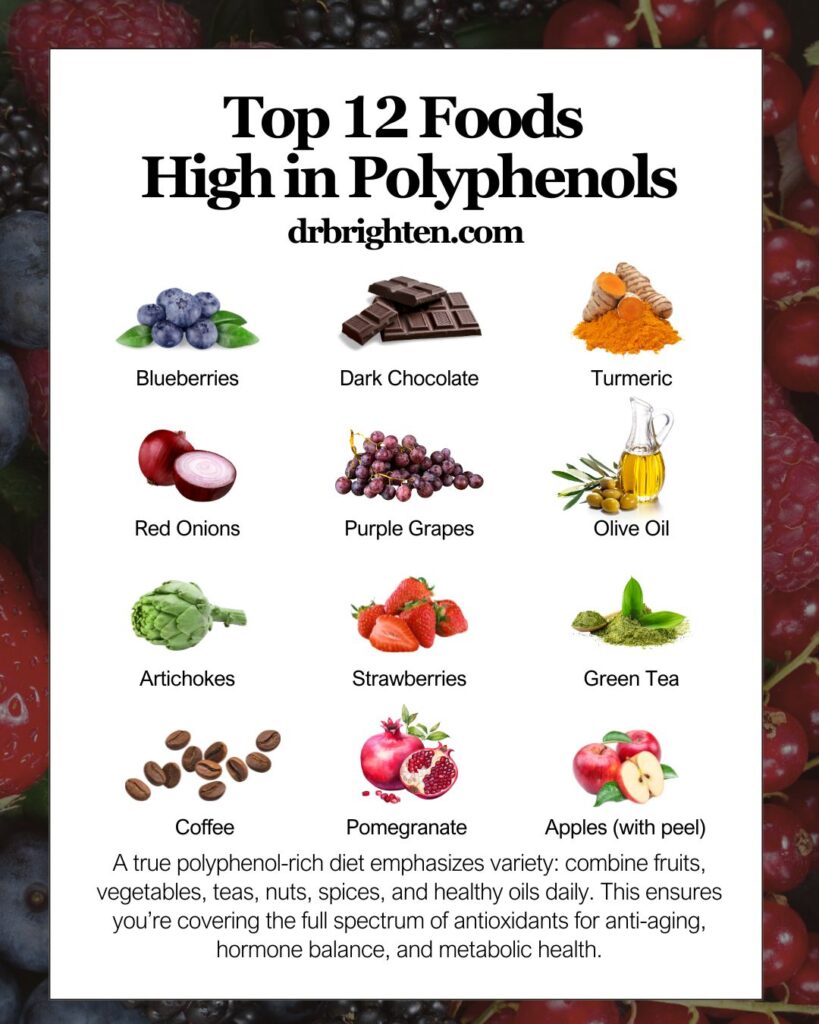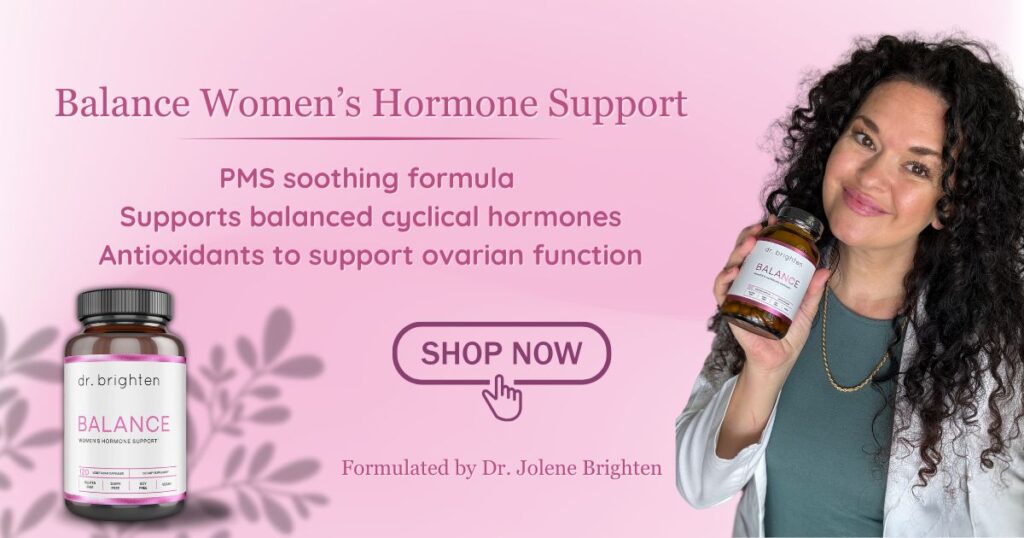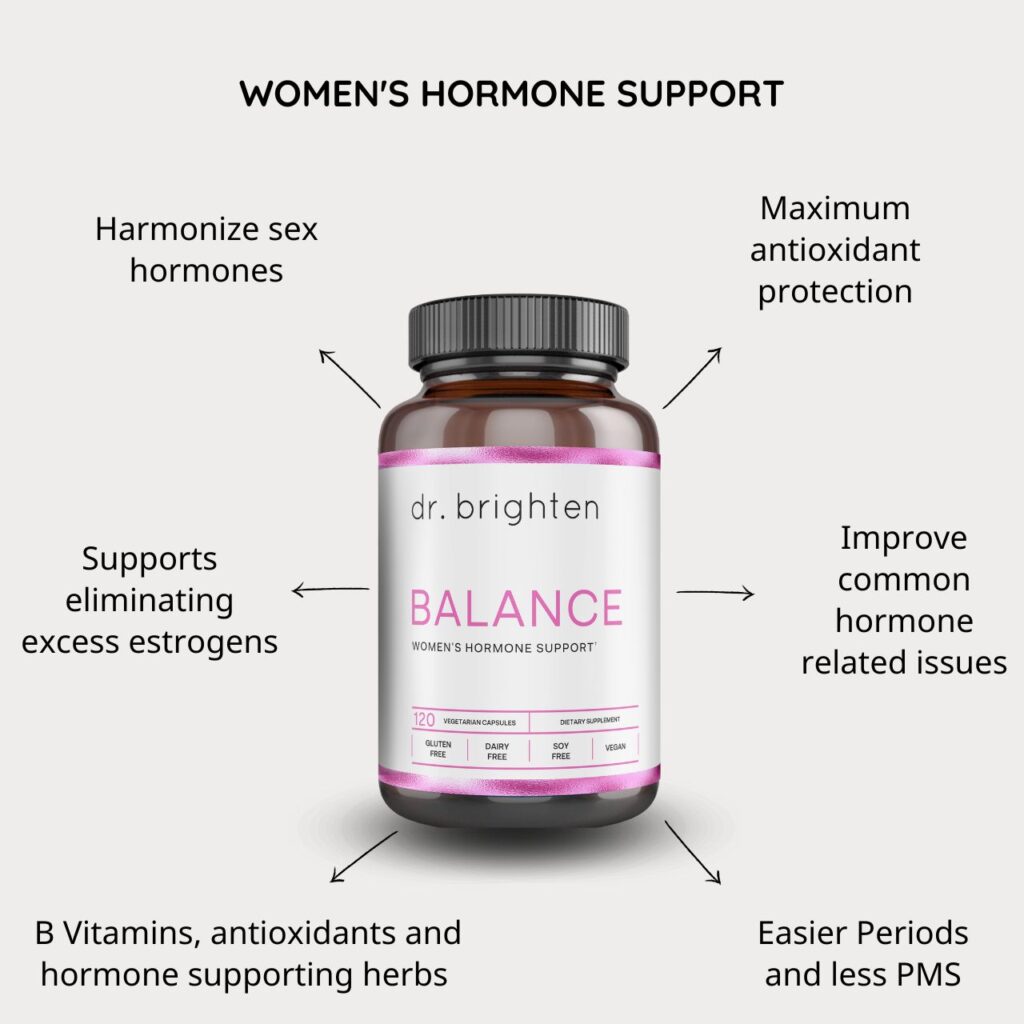Foods high in polyphenols include berries, grapes, dark chocolate, coffee, tea, and spices like turmeric and cloves. These plant compounds are antioxidants that fight inflammation, balance hormones, and support heart, brain, and gut health.
But polyphenols do more than just protect your cells. For women navigating hormone shifts in their 30s, 40s, and 50s, they offer support for metabolism, inflammation, mood, and more. Unfortunately, many Americans lack enough polyphenols1 in their diets due to low intake of plants like veggies, beans, and herbs.
Below, you'll learn what polyphenols are, how they work in the body, what foods are high in polyphenols, and how to use polyphenol supplements to your advantage. We’ll also highlight specific polyphenols like resveratrol, quercetin, and green tea catechins that have been shown to support hormone production and metabolic function.
In this article:
- What Are Polyphenols?
- Polyphenol-Rich Foods List (Chart + Quick Reference)
- Why Are Polyphenols Good for You?
- What Foods Are High in Polyphenols?
- Polyphenol-Rich Foods List (Quick Reference)
- Best Sources of Polyphenols for a Polyphenol-Rich Diet
- Foods High in MCT and Polyphenols
- Polyphenol Supplements: When and Why to Take Them
- Frequently Asked Questions About Polyphenols
- Final Thoughts: Should You Follow a Polyphenol-Rich Diet?
What Are Polyphenols?
Polyphenols are a large family of plant compounds known for their antioxidant and anti-inflammatory effects. These bioactive molecules are found in plant-based foods and give fruits, vegetables, teas, spices, and herbs their distinctive colors, tastes, and health benefits.
Believe it or not, there are more than 8,000 known types of polyphenols2, although a few get the most attention, including resveratrol, quercetin, catechins, and curcumin. Polyphenols are grouped into four main categories:
- Flavonoids (like quercetin, catechins, anthocyanins): Found in berries, onions, teas, and citrus fruits.
- Phenolic acids (like ferulic acid, caffeic acid): Found in coffee, seeds, and whole grains.
- Polyphenolic amides (like capsaicinoids, avenanthramides): Found in chili peppers and oats.
- Other polyphenols: Including resveratrol (from grapes and wine), curcumin (from turmeric), and lignans (from flaxseeds).
Each type of polyphenol interacts differently in the body, but overall, they work to combat oxidative stress, protect cells from damage3, and support cellular function.
Considering oxidative stress is a major contributor to age-related and chronic diseases, consuming more polyphenols is a wise way to protect your health at every age, but especially as you reach midlife and beyond.
For instance, studies4 show that eating more foods with polyphenols can defend against:
- High blood pressure, high cholesterol, and heart disease
- Stroke
- Diabetes and insulin resistance
- Neurodegenerative conditions like Alzheimer’s and Parkinson’s
- Certain cancers, especially hormone-related types like breast and endometrial cancer
- Gut dysbiosis and inflammation-related digestive issues
- Mood disorders, including anxiety and depression
- Skin aging
- Hormonal imbalances related to perimenopause and menopause
- Weight gain and metabolic slowdown in midlife
- And many other conditions
Related: Healthy Foods for Heart Health
Polyphenol-Rich Foods List (Chart + Quick Reference)
If you’re looking for a quick reference, here’s a chart of foods high in polyphenols along with their standout compounds and key health benefits. Use this list when planning meals or shopping so you can easily build a polyphenol-rich diet.
| Food Category | Examples | Key Polyphenols | Main Benefits |
| Fruits high in polyphenols | Blueberries, blackberries, grapes, pomegranate, apples (with peel) | Anthocyanins, Resveratrol, Quercetin | Anti-aging, hormone balance, heart + brain protection |
| Veggies high in polyphenols | Red onions, spinach, broccoli, artichokes | Quercetin, Flavonoids, Phenolic acids | Immune support, anti-inflammatory, blood sugar regulation |
| Beverages | Coffee, green tea, black tea, red wine | Catechins, Phenolic acids, Resveratrol | Energy, metabolism, cardiovascular health |
| Herbs & Spices | Cloves, turmeric, oregano, thyme, cinnamon | Curcumin, Eugenol, Rosmarinic acid | Anti-inflammatory, gut support, antioxidant boost |
| Nuts & Seeds | Walnuts, pecans, hazelnuts, flaxseeds | Lignans, Flavonoids, Phenolic acids | Hormone support, gut health, cardiovascular protection |
| Oils | Extra virgin olive oil | Hydroxytyrosol, Oleuropein | Heart health, mood, cognitive support |
| Dark Chocolate | 70% cacao or higher | Flavanols, Catechins | Brain function, insulin sensitivity, mood lift |
Why Are Polyphenols Good for You?
Polyphenols support your body in dozens of powerful ways, including during times of hormonal transition like perimenopause and menopause. For example, they're useful for easing inflammation and helping you feel more energized and balanced.
Here are some of the key health benefits of foods with polyphenols:
- Fight inflammation and oxidative stress: Polyphenols neutralize free radicals and reduce chronic inflammation that contributes to aging, hormone imbalances, joint pain, and chronic disease.
- Support gut health: Many polyphenols act as prebiotics, helping beneficial gut bacteria thrive. A healthy gut supports hormone metabolism and immune function.
- Balance blood sugar and promote insulin sensitivity: Polyphenols like resveratrol and quercetin help stabilize blood sugar levels, reduce insulin resistance, and support metabolic health. This means they're also helpful as part of a PCOS diet
- Boost brain and cognitive function: Certain polyphenols protect brain cells and improve memory, mood, and mental clarity by reducing neuroinflammation.
- Support estrogen metabolism: Polyphenols like lignans and resveratrol may help balance estrogen levels and support healthy estrogen detox pathways.
- Protect cardiovascular health: Polyphenols improve blood vessel function, lower blood pressure, and reduce cholesterol oxidation.
Research Shows A Polyphenol-Rich Diet Fights Aging:
Dr. Kara Fitzgerald, a leading voice in functional medicine and nutrigenomics, made headlines with her groundbreaking Younger You study, the first of its kind to show that biological aging can be reversed through diet and lifestyle alone. You can learn more about it in her interview episode on The Dr. Brighten Show.
As a naturopathic doctor and clinical researcher, Dr. Fitzgerald has spent years studying how food and nutrients influence gene expression, inflammation, and the aging process.
In her 2021 clinical trial, published in the journal Aging5, participants followed an 8-week lifestyle program designed to optimize DNA methylation, which is an essential epigenetic process that helps regulate aging and cellular repair.
The cornerstone of this program was a polyphenol-rich diet loaded with colorful vegetables, low-glycemic fruits, herbs, green tea, turmeric, and healthy fats.
The results were pretty remarkable: on average, participants reduced their biological age by 3.23 years in just eight weeks!
They didn’t take drugs or supplements to achieve this, just food, sleep, movement, and stress reduction. Much of the diet’s power came from its polyphenol content, which helped to lower inflammation and support methylation pathways linked to healthy aging, hormone balance, and metabolic resilience.
Based on Dr. Fitzgerald’s study, we have good evidence to suggest that eating lots of polyphenol-rich foods can support longevity and quality of life, particularly for middle-aged or older women. Research also shows that foods with polyphenols can aid in weight loss by improving insulin sensitivity and fat metabolism.

What Foods Are High in Polyphenols?
If you want to support your health and hormones naturally, start by adding more polyphenol-rich foods into your daily meals.
The best source of polyphenols is whole, minimally processed plant foods, and you're most likely to obtain a variety of these beneficial antioxidants when you “eat the rainbow” and aim for variety.
Here are 12 of the top polyphenol-rich foods:
1. Berries (especially blueberries, blackberries, strawberries, raspberries, cranberries)
Berries are loaded with anthocyanins, a class of flavonoids with antioxidant and anti-inflammatory benefits. These fruits are also high in fiber and relatively low in sugar, making them ideal for balancing blood sugar and supporting gut health.
2. Extra Virgin Olive Oil
Cold-pressed olive oil is rich in hydroxytyrosol and oleuropein, two phenolic compounds that protect heart health, reduce inflammation, and even fight cancerous tumor growth6. Olive oil consumption is also linked to better cognitive function in older age, as well as decreased symptoms of depression and anxiety7.
3. Dark Chocolate (70% cacao or higher)
Cacao contains flavanols and other antioxidants, which have been shown to improve brain function, blood flow, and insulin sensitivity8. Dark chocolate is even considered a “functional food” due to its anti-diabetic, anti-inflammatory, and anti-microbial properties.
Look for unsweetened or low-sugar dark chocolate and stick to 1-2 pieces per day for the greatest benefits.
4. Green and Black Tea
Both teas are rich in catechins and theaflavins, polyphenols that support metabolism, hormone balance, and healthy estrogen detox.
Our Myoinositol Plus formula includes Green Tea Extract to support insulin sensitivity and metabolic function9, especially in women who are overweight, obese, or with PCOS or perimenopausal weight changes.
5. Red and Purple Grapes (and Red Wine)
Grapes are high in resveratrol, a polyphenol with anti-aging, heart-protective10, and estrogen-modulating effects11.
Our Balance Women's Hormone Support formula contains resveratrol to support estrogen balance and cellular resilience during hormonal transitions. Additionally, it contains B vitamins, traditional botanicals, and magnesium and calcium to help support bone and hormone health.
6. Pomegranate
Pomegranates are rich in ellagitannins, which have been shown to reduce oxidative stress, promote a healthy gut microbiome12, and support hormone balance and cardiovascular health. Consumption of ellagitannins has been associated with protection against heart diseases, neurodegenerative syndromes, and certain types of cancer.
7. Herbs and Spices (especially turmeric, oregano, thyme, and cloves)
Cloves13 top the list of all foods for polyphenol content. Turmeric contains curcumin, another well-studied polyphenol with powerful anti-inflammatory effects14.
You can either add these herbs and spices to your meals or take them in supplement or essential oil form (often used topically) for more concentrated dosages and benefits.
8. Flaxseeds
Flaxseeds are high in lignans, a type of polyphenol that supports estrogen metabolism and has been shown to have anti-inflammatory effects15. They also provide fiber and omega-3 fats, which support hormone balance, gut function, and mental health.
9. Red Onions
Onions are one of the best veggies high in polyphenols, particularly quercetin, which supports immune function, manages inflammation, and regulates blood sugar.
Our Women's Twice Daily multivitamin includes quercetin to help support immunity, histamine balance, and antioxidant defenses.
10. Apples (especially with the skin)
Apples are a good source of polyphenols like phloridzin and quercetin16, which are most concentrated in the skins. They also provide fiber, potassium, and vitamin C.
11. Coffee and Green Tea
Both of these popular beverages are rich in phenolic acids and catechins. In fact, in the average American diet, the largest source of antioxidants is coffee17!
These compounds can help reduce inflammation, support mental alertness, and provide a clean source of antioxidants. Because they contain caffeine, it's best to limit intake to several cups per day.
12. Nuts (especially walnuts, hazelnuts, pecans)Nuts contain multiple types of polyphenols, along with healthy fats, fiber, and minerals. They’re a great choice for balancing blood sugar and supporting heart health, particularly walnuts, which have been shown to have high levels of polyphenols18 as well as healthy fats.

Polyphenol-Rich Foods List (Quick Reference)
Here’s a condensed polyphenol-rich foods list for easy shopping and build a polyphenol rich diet:
- Blueberries, blackberries, raspberries
- Pomegranate
- Grapes
- Apples (with peel)
- Red onions
- Green tea and black tea
- Coffee
- Dark chocolate (70%+ cacao)
- Extra virgin olive oil
- Flaxseeds
- Cloves, turmeric, oregano, and other herbs and spices
- Pecans, walnuts, hazelnuts
Veggies High in Polyphenols
Vegetables aren’t just packed with fiber, vitamins, and minerals — many are also rich in polyphenols. Some of the best veggies high in polyphenols include:
- Red onions (quercetin, a powerful antioxidant that supports immunity and blood sugar)
- Spinach and broccoli (flavonoids that fight inflammation and oxidative stress)
- Artichokes (one of the highest veggie sources of polyphenols)
Adding these vegetables to your meals daily helps strengthen your gut, support hormone metabolism, and provide a wide spectrum of antioxidants.
Fruits High in Polyphenols
If you’re wondering which fruits are the richest in polyphenols, berries top the list. In fact, berries are among the fruits richest in anthocyanins, which give them their vibrant color and anti-inflammatory power.
- Berries: Blueberries, blackberries, raspberries, strawberries, cranberries
- Apples (with the peel): High in quercetin and other polyphenols
- Grapes (especially red and purple): Rich in resveratrol, linked to heart and brain health
- Pomegranate: Loaded with ellagitannins that protect the gut and cardiovascular system
These fruits high in polyphenols are not only delicious but also key for hormone support, brain health, and slowing cellular aging.
Best Sources of Polyphenols for a Polyphenol-Rich Diet
While many plant foods contain some level of antioxidants, the best sources of polyphenols come from a few standout groups:
- Berries, grapes, and pomegranate: rich in anthocyanins and resveratrol
- Teas and coffee: provide catechins and phenolic acids, major contributors to antioxidant intake worldwide
- Herbs and spices like cloves, turmeric, oregano, and cinnamon: pound for pound, some of the most concentrated polyphenol sources
- Nuts and seeds (especially walnuts, pecans, flaxseeds): lignans and flavonoids that also support hormone metabolism
- Extra virgin olive oil and dark chocolate: functional foods shown to improve heart and brain health
A true polyphenol-rich diet emphasizes variety: combine fruits, vegetables, teas, nuts, spices, and healthy oils daily. This ensures you’re covering the full spectrum of antioxidants for anti-aging, hormone balance, and metabolic health.

Foods High in MCT and Polyphenols
Medium-chain triglycerides (MCTs) are a type of healthy fat found in coconut and palm oil that support brain function and metabolism. While MCTs aren’t polyphenols themselves, combining MCT-rich foods with polyphenol-rich ingredients is one way to supercharge your metabolic health.
Some of the best MCT and polyphenol food combinations include:
- Coffee with MCT oil and cacao powder: Boosts energy, brain function, and antioxidant support. This is a popular MCT and polyphenols food combo among “biohackers” who are looking for a lift in energy, mood, and fat-burning, including while fasting.
- Smoothies with berries, flaxseed, coconut oil, and green tea powder: Provides fiber, healthy fats, and polyphenols.
- Salads dressed with extra virgin olive oil and herbs: Combines heart-healthy fats and plant antioxidants.
Related: What is The Best Diet for Perimenopause? and Is There a Natural Ozempic?
A High-Antioxidant Eating Plan for Perimenopause & Menopause:
If you're navigating the hormone shifts of perimenopause and struggling with stubborn weight gain, fatigue, or cravings—even while eating healthy—know that these changes aren’t your fault; they’re a natural part of the hormonal transition that impacts everything from metabolism to sleep.
That’s why I created the Perimenopause Weight Loss Action Plan, a free, doctor-designed guide tailored to the unique needs of women in their 40s and beyond.
Inside, you’ll find a 7-day anti-inflammatory meal plan, hormone-balancing recipes, movement guidance, and supplement tips, all designed to help you work with your changing hormones, not against them. Download the free plan here.
Polyphenol Supplements: When and Why to Take Them
While whole foods are the best source of polyphenols, supplements can be a helpful addition. They're especially helpful and convenient during times of increased stress, hormonal shifts, or inflammation—or whenever you're missing a variety of plant foods in your diet.
Here’s what you should know about polyphenol supplements:
- Resveratrol: Often used to support anti-aging, brain function, and estrogen balance. Found in Balance Women's Hormone Support.
- Green Tea Extract (EGCG): Can help support metabolism, fat burning, and insulin sensitivity. Found in Myoinositol Plus.
- Quercetin: Can help reduce histamine response, improve immunity, reduce oxidative stress, and provide a range of anti-aging benefits19. Found in Women's Twice Daily.
- Curcumin: Shown to help reduce joint pain, inflammation, and even PMS symptoms. Provides strong antioxidant effects that can support heart, liver, and brain health20.
- Grape Seed Extract and Pomegranate Extract: Commonly used for cardiovascular and skin support.
Polyphenol Supplements: Why Resveratrol and Sulforaphane Matter
While whole foods are the foundation of a polyphenol-rich diet, certain supplements can provide extra support during times of hormonal transition, inflammation, or increased stress. Two particularly powerful compounds are resveratrol and sulforaphane.
- Resveratrol is a polyphenol found in grapes and red wine that’s been shown to support estrogen balance, cardiovascular health, and healthy aging at the cellular level.
- Sulforaphane, a compound concentrated in broccoli sprouts and cruciferous vegetables, works alongside polyphenols to activate detoxification pathways, lower inflammation, and support hormone metabolism.
Together, these compounds make a strong team for women navigating perimenopause and menopause, when estrogen balance, cellular resilience, and metabolic health become especially important.
That’s why I included both in Balance Women’s Hormone Support — a doctor-formulated supplement designed to provide targeted support for hormone health and graceful aging. By combining resveratrol, sulforaphane, and other evidence-backed nutrients, it offers a convenient way to complement a polyphenol-rich diet.
Think of supplements not as a replacement for colorful, plant-rich meals, but as an added layer of support when you need extra help with energy, hormone balance, or longevity.
Polyphenol Supplements: Green Tea Extract for Metabolism & Hormones
Another standout polyphenol is green tea extract (EGCG), which is concentrated in green tea leaves and widely studied for its metabolic and hormone-balancing effects.
- EGCG (epigallocatechin gallate) is a catechin polyphenol that supports insulin sensitivity, fat metabolism, and cardiovascular health.
- Research shows that green tea polyphenols may help with weight management, especially when combined with movement and a balanced diet.
- Green tea extract also supports detoxification pathways and provides antioxidant protection for the brain and liver.
For women navigating PCOS, perimenopause, or midlife metabolic shifts, these benefits can make a big difference. That’s why I included green tea extract in Myoinositol Plus — a formula designed to support healthy insulin sensitivity, ovarian function, and hormone balance.
By combining inositol (a nutrient that helps regulate insulin signaling) with polyphenols like green tea extract, Myoinositol Plus provides dual-action support for both metabolism and hormone health.
It’s an easy way to complement a polyphenol-rich diet if you’re looking to balance blood sugar, support ovarian function, or maintain a healthy weight.
Polyphenol Support in Dr. Brighten Essentials
While food is always the foundation of a polyphenol-rich diet, some of my doctor-formulated supplements also provide polyphenols or synergistic plant compounds. These can be especially helpful if you’re looking for targeted support for hormones, stress resilience, or metabolic health.
- Balance Women’s Hormone Support: Combines resveratrol (from grapes) and sulforaphane (from broccoli sprouts) to support estrogen balance, detox pathways, and healthy aging.
- Myoinositol Plus: Includes green tea extract (EGCG), a catechin polyphenol that supports insulin sensitivity, ovarian function, and healthy metabolism.
- Women’s Twice Daily Multivitamin: Provides quercetin, a flavonoid polyphenol known for immune balance, histamine regulation, and antioxidant protection.
- Adrenal Support: Contain adaptogenic herbs such as ashwagandha, rhodiola, and holy basil, which are naturally rich in flavonoids and phenolic acids that help lower stress and support resilience.
Together with a polyphenol-rich diet, these formulas offer a convenient way to fill in nutritional gaps and provide science-backed support for women navigating hormone changes, metabolic shifts, or high stress.
How to Take Polyphenol Supplements:
Ideally, use antioxidant supplements along with a balanced, healthy diet, but not in place of one.
- Take supplements with meals for better absorption, especially if the product contains fat-soluble compounds (such as vitamins K, D, E).
- Choose standardized formulas that provide clinically studied dosages (not just “proprietary blends”).
- Look for synergistic nutrients like vitamin C, magnesium, and adaptogenic herbs for enhanced effects. If taking turmeric/curcumin, combine it with black pepper extract (often found in the same supplements) to boost absorption.
Frequently Asked Questions About Polyphenols
Yes, polyphenols are plant compounds with powerful antioxidant and anti-inflammatory effects. They help protect your cells from damage, support hormone balance, improve gut health, and reduce risk of chronic conditions like heart disease, diabetes, and neurodegeneration.
Foods high in polyphenols include berries, grapes, apples, red onions, dark chocolate, coffee, tea, olive oil, nuts (like walnuts and pecans), flaxseeds, and spices such as turmeric and cloves. Eating a variety of these foods daily ensures a broad spectrum of antioxidant protection.
The best sources of polyphenols are colorful fruits (especially berries, grapes, and pomegranates), green and black tea, coffee, red wine, extra virgin olive oil, and spices like cloves and turmeric. These foods are particularly concentrated in polyphenols and have been the most studied for health benefits.
Fruits rich in polyphenols include blueberries, blackberries, raspberries, strawberries, cranberries, grapes (especially red and purple), apples with skin, and pomegranate. These fruits provide anthocyanins, resveratrol, quercetin, and other antioxidants that support aging, hormones, and metabolism.
Veggies high in polyphenols include red onions, spinach, broccoli, kale, and artichokes. These vegetables are excellent sources of flavonoids and phenolic acids that reduce inflammation and support immune function.
The health benefits of polyphenols include:
– Fighting oxidative stress and inflammation
– Supporting gut health and beneficial bacteria
– Balancing blood sugar and improving insulin sensitivity
– Protecting heart and blood vessel health
– Supporting brain function and mood
– Helping with hormone metabolism during perimenopause and menopause
– Slowing cellular aging and protecting DNA
Some foods with polyphenols for weight loss — like green tea, coffee, and berries — may help improve insulin sensitivity, metabolism, and fat oxidation. While polyphenols aren’t a magic bullet, they support metabolic health, which can make maintaining a healthy weight easier.
The best way to get polyphenols is through whole foods — berries, grapes, onions, coffee, tea, spices, nuts, and olive oil all provide a wide spectrum of antioxidants, plus fiber and nutrients that supplements alone can’t replace.
That said, polyphenol supplements can be a smart addition when your diet falls short or when you’re looking for targeted support. For example:
– Resveratrol and sulforaphane, found in Balance Women’s Hormone Support, help with estrogen balance, detoxification, and cellular resilience.
– Green tea extract (EGCG), included in Myoinositol Plus, supports insulin sensitivity, metabolic health, and hormone regulation.
– Quercetin and curcumin, found in other antioxidant blends, are useful for immune health, inflammation, and longevity.
The ideal approach is to combine both: a polyphenol-rich diet as your foundation, supported by high-quality supplements when you need extra help for hormones, metabolism, or stress resilience.
Final Thoughts: Should You Follow a Polyphenol-Rich Diet?
- If you’re looking to support hormone balance, gut health, and graceful aging from the inside out, a polyphenol-rich diet is a simple and effective place to start.
- Studies show that consuming lots of polyphenol-rich foods like berries, teas, coffee, dark chocolate, nuts, and vegetables is one of the best ways to protect your health.
- Dr. Kara Fitzgerald’s research shows that a diet rich in polyphenols can actually reverse biological age markers, making you not just feel younger, but be younger on a cellular level.
- Instead of restricting calories or eliminating entire food groups, focus on adding more colorful, fiber-rich, polyphenol-packed foods to your plate each day. This style of eating can help:
- Ease perimenopausal symptoms
- Improve energy and cognition
- Support a healthy weight
- Strengthen your gut-brain-hormone axis
References
- https://pubmed.ncbi.nlm.nih.gov/32807722/ ↩︎
- https://www.sciencedirect.com/science/article/abs/pii/S0006295218303228?via%3Dihub ↩︎
- https://pmc.ncbi.nlm.nih.gov/articles/PMC8621732/ ↩︎
- https://pubmed.ncbi.nlm.nih.gov/35694805/ ↩︎
- https://www.aging-us.com/article/202913 ↩︎
- https://pubmed.ncbi.nlm.nih.gov/38540115/ ↩︎
- https://pubmed.ncbi.nlm.nih.gov/39696776/ ↩︎
- https://pubmed.ncbi.nlm.nih.gov/36300165/ ↩︎
- https://pubmed.ncbi.nlm.nih.gov/38031409/ ↩︎
- https://pubmed.ncbi.nlm.nih.gov/30816367/ ↩︎
- https://www.mdpi.com/1420-3049/27/20/6973 ↩︎
- https://pubmed.ncbi.nlm.nih.gov/36673365/ ↩︎
- https://pmc.ncbi.nlm.nih.gov/articles/PMC9312110/ ↩︎
- https://pmc.ncbi.nlm.nih.gov/articles/PMC4227268/ ↩︎
- https://pubmed.ncbi.nlm.nih.gov/39628469/ ↩︎
- https://pmc.ncbi.nlm.nih.gov/articles/PMC442131/ ↩︎
- https://www.webmd.com/food-recipes/antioxidants-your-immune-system-super-foods-optimal-health ↩︎
- https://pubmed.ncbi.nlm.nih.gov/36904251/ ↩︎
- https://pubmed.ncbi.nlm.nih.gov/35458696/ ↩︎
- https://pubmed.ncbi.nlm.nih.gov/35889273/ ↩︎


